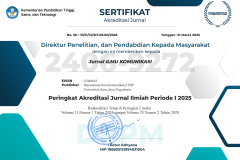The Emergence of the Philippine "Anti-Media": The Duterte Factor
DOI:
https://doi.org/10.24002/jik.v14i1.833Abstract
The Philippine news media is perceived to be the freest in Asia. However, it also has its faults which its audiences have noticed. This study was aimed at exploring the factors which have lead to the audience’s dissent and subsequent emergence of an online anti-media movement. A qualitative research method was utilized where in social media posts and websites were analyzed with the Agenda Setting Theory to explain the frames being made by the mainstream and anti-media. The results showed factors such as the internet and its tools in creating a new virtual community.Downloads
Published
How to Cite
Issue
Section
License
Jurnal ILMU KOMUNIKASI is an academic journal. As such, it is dedicated to the open exchange of information. For this reason, JIK is freely available to individuals and institutions. Authors who publish in Jurnal ILMU KOMUNIKASI will release their articles under the Creative Commons Attribution (BY) License. This license allows anyone to copy and redistribute the article in any medium or format as well as remix, transform, and build upon the material for any purpose, even commercially as long as they credit the authors for the original creation. For details of the rights authors grants users of their work, see the "human-readable summary" of the license, with a link to the full license. (Note that "you" refers to a user, not an author, in the summary)
 This work is licensed under a Creative Commons Attribution 4.0 International License.
This work is licensed under a Creative Commons Attribution 4.0 International License.













